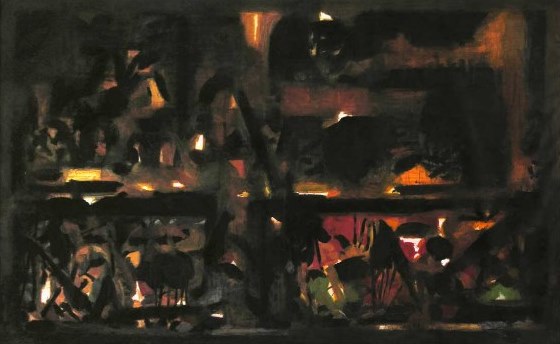Art Musings is honoured to be a collaborator on ‘Zamin: Homelands’, an exhibition of works by S H Raza, at the JNAF Gallery, CSMVS Museum. This is a momentous year, in which Raza’s centenary coincides with the Museum’s 100th year. The exhibition is presented through a multi-partnership between the CSMVS Museum, Jehangir Nicholson Art Foundation, Art Musings and the Raza Foundation.
The exhibition’s title is inspired by Raza’s seminal work ‘Zamin’, created in 1971. The exhibition explores the artist’s landscapes through a conception of place, territory, borders and belonging. In ‘Zamin: Homelands’, we feature paintings from the Jehangir Nicholson Collection and other collections in the city alongside archival material sourced from the Raza Foundation.
To quote exhibition curator Puja Vaish, “‘Zamin: Homelands’ traces Raza’s oeuvre as a landscape artist, a diaspora artist and as an artist in pursuit of an Indian modern sensibility. In Raza’s artworks we see these paradigms merge through a recourse to abstraction. The exhibition hinges on the period between the 60s – 70s, when Raza moved from painting street scenes to an abstraction of nature, which originated through a desire to connect with the Indian forest landscape. From this defining juncture, we look back at some of the early cityscapes of Bombay, the French landscapes and the later ‘Bindu’ works of the 80s which he became most known for.
Among the first Indian diaspora artists, Raza encapsulated in his work the profound experience of expressing one’s identity through the eyes of the other within a global context. The external to inward gaze, meshed ideas of the native and the foreign, the East and the West. The quest for rootedness in one’s origins is observed in many of the artists who moved to the West. For Raza, this meant a deep study of Indian aesthetics, spiritual scriptures and revisiting his childhood- to rekindle a sense of wonder and meaning to nature and the environment. The exhibition showcases Raza’s experiments with European and Indian painterly traditions to arrive at a unique form of abstraction. Raza’s painting titles, letters exchanges and diary notes written in French, English and Devanagari, reveal his varied knowledge of art, literature, poetry and philosophy of world cultures.”

